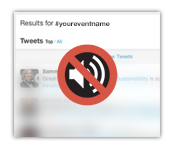Oops! 4 Common Social Media Mistakes for Events & How to Avoid Them
A few years ago, social media was no more than a simple, private way to keep in touch with friends. Today, as Facebook prepares its IPO, we can see that social media plays a much bigger role in our lives than simply a channel for personal communication. Social media has become a network for business owners of small and large organizations to connect with their customers. It’s no surprise why event planners want to implement a social media strategy at their event but let’s just make sure to do it right. With new events every week, we at EventMobi see a lot of different promotional strategies over social media. Some wildly successful, some less so. Here are four common social media blunders committed by event professionals as well as some pointers on how to avoid them.
Mistake #1: Not considering the social media channels your target audience uses
When people hear “Social Media”, they often immediately think of Facebook and Twitter. Be sure to resist the temptation and not restrict yourself to the big two. There are numerous social media channels available out there such as Linkedin and Pinterest that can allow for highly targeted marketing and promotion. Don’t post everywhere for the sake of being everywhere. Instead, come up with a strategic plan and focus your posting on the social media channel that your target audience uses the most. Almost 70% of Pinterest users are female and less than 0.5% of Linkedin members are in the agriculture industry. It’s easy to get quick insights like these; a quick Google search on social media sites’ demographics can give you a sense of where your future attendees are.
Mistake #2: Going #hashtag crazy

Mistake #3: Not using social media to generate pre-event buzz.
Social media can be an inexpensive and effective way to generate buzz and increase registration numbers at your event. Promote your event early and encourage others to share event registration with friends and colleagues. Don’t try and pull your attendees to you, go to them. Share registration links in places your future attendees already exist. Possibly the same way you came to this blog post via Twitter when we tweeted: “#eventprofs! Find out what the 4 most common social media blunders are and how to avoid them! “
If you have a company blog page, make sure to mention your event there as well. Use the opportunity to explain the benefits of the event and what attendees can expect to get out of it. If it’s in the budget, consider a 2-minute video to really build some buzz around your event. If you have a mobile app built for your event, share the location of the app in all of your communications. Whether it’s through a URL, QR code, or App Store, make sure your attendees know how to access your mobile event app.
To learn more about successful promotional strategies on how to increase your mobile event app usage, check out our other blog post.
Mistake #4: Ignoring what your attendees are saying
It’s natural that with such an easy way to share information, one would want to push out as much as possible with the hope that someone will click on something. Don’t think of social media as a megaphone, think of it as a conversation with a friend (a conversation that everyone is listening to). Social media is a great channel to find out what attendees are expecting from your event and what they hope to get out of it. Ask questions, encourage comments, and engage in conversations. All this interaction will make your social media presence more interesting to followers and can significantly improve the overall event experience.
Let’s recap how we can avoid these common social media mistakes:
- First, discover what digital communities your future attendees participate in. Second, use a #hashtag to organize and brand event communications.
- And last but not least, promote, socialize, and engage in conversations. Though you may be directing your comment at one attendee over Twitter, your comments are being viewed by thousands. No pressure!
Next time you’re planning your next social media strategy, keep these points in mind. Stay chatty, be relevant, and keep it interesting! Good luck!

